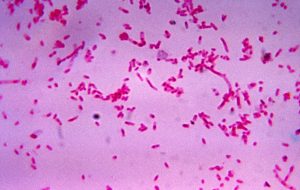Researchers at the Columbia University College of Dental Medicine have determined how F. nucleatum–a common oral bacteria often implicated in tooth decay–accelerates the growth of colon cancer. The study was published online in the journal EMBO Reports.
The findings could make it easier to identify and treat more aggressive colon cancers. It also helps explain why some cases advance far more quickly than others, thanks to the same bacteria found in dental plaque.
Colon cancer is the second leading cause of cancer death in the U.S. Researchers have long known that the disease is caused by genetic mutations that typically accumulate over the course of a decade.
“Mutations are just part of the story,” said study leader Yiping W. Han, PhD, professor of microbial sciences at Columbia University’s College of Dental Medicine and Vagelos College of Physicians & Surgeons. “Other factors, including microbes, can also play a role.”
Scientists have also demonstrated that about a third of colorectal cancers are associated with a common oral bacterium called F. nucleatum. Those cases are often the most aggressive, but nobody knew why. In a prior study, Han’s research team discovered that the bacterium makes a molecule called FadA adhesin, triggering a signaling pathway in colon cells that has been implicated in several cancers. They also found that FadA adhesin only stimulates the growth of cancerous cells, not healthy cells. “We needed to find out why F. nucleatum only seemed to interact with the cancerous cells,” said Han.
In the current study, the researchers found in cell cultures that noncancerous colon cells lack a protein, called Annexin A1, which stimulates cancer growth. They then confirmed both in vitro and later in mice that disabling Annexin A1 prevented F. nucleatum from binding to the cancer cells, slowing their growth.
The researchers also discovered that F. nucleatum increases production of Annexin A1, attracting more of the bacteria. “We identified a positive feedback loop that worsens the cancer’s progression,” said Han. “We propose a two-hit model, where genetic mutations are the first hit. F. nucleatum serves as the second hit, accelerating the cancer signaling pathway and speeding tumor growth.”
The researchers then looked at an RNA-sequencing dataset, available through the National Center for Biotechnology Information of 466 patients with primary colon cancer. Patients with increased Annexin A1 expression had a worse prognosis, regardless of the cancer grade and stage, age, or sex.N
The researchers are currently looking for ways to develop Annexin A1 as a biomarker for more aggressive cancers and as a potential target for developing new treatments for colon and other types of cancer.
Source: Columbia University College of Dental Medicine
How a common oral bacteria makes colon cancer more deadly
74
SHARES
1.2k
VIEWS
Leave a Reply Cancel reply
Browse by Category
Tags
AAMI
AORN
Award
Bacteria
BIOCHEMISTRY
biology
cancer
CBSPD
Chemotherapy
colon cancer
colorectal cancer
colorectal cancer screening
COVID-19
Diagnostics
Duodenoscope
Education
EndoChoice
EndoPro Magazine
Endoscope
Endoscopy
FDA
gastroenterology
gastrointestinal disorders
Genetics
Healthmark
Hospitals
IAHCSMM
IBD
IBS
Infections
irritable bowel syndrome
MEDICINE/HEALTH
News
Olympus
Pentax
PHARMACEUTICAL CHEMISTRY
PHARMACEUTICAL SCIENCE
polyps
PPE
Public Health
recall
Screening
SGNA
Studies
Super Bugs
© 2023 Copyright. All Rights Reserved. Design & Developed by Insightful Technologies.














